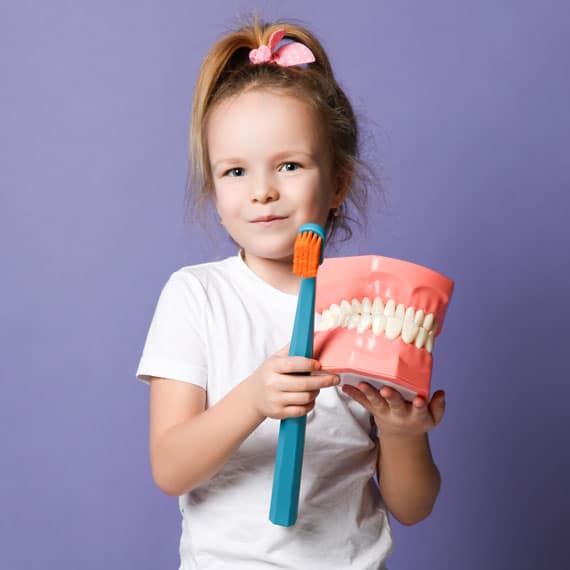
5 Important Tips for Kids' Dental Care
It’s critical to keep a careful eye on your child as they wash and floss their teeth. You may need to ensure that they use the correct technique and brush for the appropriate time frame. Teaching children good oral hygiene habits can help them maintain healthy teeth.
Most behaviors, including proper dental care, are formed from early childhood. Parents also want a bright smile and white teeth for their kids and also good oral hygiene is necessary for maintaining strong teeth and gums. Here are some key dental care guidelines for children that parents should follow:
Start the day with breakfast
A nutritious and balanced breakfast helps children perform well during the day. Cravings for sweets are lessened by consuming protein early in the day. It is necessary to teach kids about the effects of food on their bodies. You may also tell them the difference between empty calories and those that sustain them. Show them how a nutritious meal gives them the energy they need for the rest of the day.
Teach them how to brush and floss
Dental hygiene may begin as soon as your child is born or around the age of one or two. At this age, you may begin with a soft-bristled child-sized toothbrush. You may also mix in a little amount of fluoride-free toothpaste. When they are old enough to spit out the toothpaste, you can move to fluoride-containing toothpaste. But start with only a little quantity. Remind your kid to distribute it evenly across their teeth, gums, and tongue.
Your kid will most likely want assistance cleaning their teeth until the age of 7 or 8. At this age, kids can begin using a bigger toothbrush. Brushes may be replaced every 3 to 6 months, or usually when the bristles become frayed. Flossing is another important aspect of your child’s oral hygiene regimen. Show them the importance of flossing at least once a day. To simplify things, you may get floss with a handle. Moreover, ensure your kid understands the importance of brushing before going to bed.
Limit sugary foods and sodas
Children who consume a lot of sugary meals and drinks may be predisposed to cavities. Making healthy dietary choices is important for your kid’s oral hygiene. You may limit the amount of soda, fruit juice, or sweetened beverages they consume. During meals, keep sugary snacks and beverages to a minimum. Whenever your kid consumes sugar, ensure that they wash their teeth subsequently. Chewing gum is not harmful to older children. It can bring advantages such as:
- Increasing the jaw’s strength
- Assisting in saliva production
- Getting rid of food scraps
- Controlling the acid that might cause tooth decay
However, gums with added sugar may cause cavities. Minimize the amount of sugary gum your child consumes or simply offer them sugar-free gum.
Take them to the dentist regularly
Routine dental examinations, which include teeth cleaning and risk assessment, can preserve your child’s oral health. This allows the dentist to detect early abnormalities with your child’s teeth. Pediatric dentists and hygienists are experts in caring for children’s teeth. If you notice any of the following symptoms, please contact your dentist straight away:
- Your kid is experiencing dental discomfort or has a tooth or mouth issue
- Your kid loses a permanent tooth
The dentist will advise you on good oral hygiene. Taking your child to the dentist at an early age will help him or she develop the habit of regular dental checkups. It will also assist to alleviate the anxiety that is common while seeing the dentist.
Practice what you preach
Children learn by watching their parents. Don’t only instruct them to brush and floss; show how you carry out these activities as well. You may brush and floss together every morning and before bed. Consume nutritious foods and restrict your intake of sugar. Moreover, regularly see the dentist.
Frequently Asked Questions
What Are Cavities And Can Kids Get Them?
Cavities are holes that develop in the teeth. They can happen when germs accumulate in your mouth. Added sugar in meals and beverages converts to acid, which may erode your teeth. Cavities are more prevalent in kids since their teeth are more difficult to clean. Everyone in your household may practice proper oral hygiene to prevent cavities. Bacteria that cause cavities may be passed on to unborn babies, newborns, and toddlers by individuals around them who have cavities.
Yes. Kids can get cavities, too. If your kid exhibits any of the following conditions, he or she may be at risk for cavities:
- White or brown patches on their teeth
- Continuous specific healthcare requirements
- Irregular dental checkups
Conclusion
Proper care of your child’s teeth and gums is a vital aspect of keeping them healthy. This includes practicing proper dental hygiene and taking them to the dentist regularly. It may be easy to put off thinking about your child’s dental health until they have a full set of teeth. However, taking care of their dental hygiene may begin much sooner. You don’t have to wait until your child’s first tooth appears to start preparing him or her for dental wellness. Visit Bellevue Azalea Dentistry now to get started with your child’s dental treatment.

